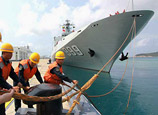
The U.S. side recently continued to hype up "China network threat theory" and even alleged that cyber attacks could be more serious than terrorist attacks. Meanwhile, the U.S., Japan, South Korea, Germany, UK and even China's Taiwan built up and enlarged their own cyber armies successively. Therefore, China has to make some response to safeguard its cyberspace security and national interests.
Tactically, to actively respond to barefaced challenges of the U.S. senior officials
First, China should admit the serious threats from the U.S. cyber attacks and hackers to the security of China and the world at large.
Second, China should commit itself to investigating the fact that the successful cyber attacks against China in the first two months of the year originated from IP addresses in the U.S. and the supporters of the cyber attacks.
Third, China should launch multilateral dialogues and discuss handing over the right of the Internet management under the absolute control of the U.S. to the United Nations (UN).
Strategically, to perform three kinds of state acts
First, as other countries have been enlarging their cyber armies, China has to set up its cyberspace defense force as soon as possible, so as to resolutely safeguard its cyberspace state sovereignty, security and development interests.
Second, China should conduct bilateral negotiations with the U.S. side, so as to develop China-U.S. cyber relationship that can ensure mutual security.
Third, China should strengthen international cooperation with other countries and build a peaceful, safe, open and cooperative cyberspace. China should actively use such platforms as the Shanghai Cooperation Organization (SCO) and the "BRICS" (Brazil, Russia, India, China and South Africa) to push forward the multilateral mechanism represented by the UN, strive to make a breakthrough in the right of Internet management under the absolute control of the U.S. in accordance with internationally accepted international law, and principles and practices of international relations, and work together with other countries in the world to jointly step into a cyber era of harmonious development.
By Qin An, PhD in information security and director of the Cyberspace Strategic Studies Institute
















 Life aboard a fishing boat under bridge in city of Chongqing
Life aboard a fishing boat under bridge in city of Chongqing


![]()
